Happy employees are productive, engaged employees. Yet, according to a 2023 Work in America Survey conducted by the American Psychological Association, 55 percent of workers either strongly or somewhat agree that their employer has a rosier view of the mental health in their workplace than they do.
Respondents also revealed how pervasive work-related stress is — 77 percent of them said they’ve been stressed at work, and the stress has impacted 57 percent of them negatively. How an employer responds to these issues is also incredibly important for retention, as 92 percent of respondents said they’re interested in working for an organization that’s concerned about employees’ well-being.
Employee mental health is a key pillar of a healthy work environment, so it’s important to gauge how employees are feeling and use that data to provide the right kind of support. Employers can begin providing that support by conducting a mental health survey to uncover obstacles to employee well-being.
In this article, we’ll share 50 mental health survey questions to ask and explain why mental health surveys are important. We’ll also consider work-related risk factors for mental health and the impact of mental health problems on work, and we’ll show you how to create a mental health survey using Jotform.
The importance of mental health surveys
Asking the right mental health survey questions allows employers to better understand employee mental health concerns, discover problems and challenges, and identify key areas for improvement and employee support — effective support that ultimately leads to happier employees who thrive in the workplace.
After all, if you don’t know what’s causing employees to feel stressed, overwhelmed, demotivated, etc., you won’t know how to alleviate these issues to improve employee well-being and performance.
Another big benefit of mental health surveys is the anonymity and privacy they provide. While employees may not feel comfortable talking directly with a manager or someone else in leadership about their challenges, a mental health survey gives them the opportunity to share their concerns honestly, without fear of embarrassment or stigma.
Work-related risk factors that impact mental health
Many routine work-related challenges can negatively impact mental health. These include
- Excessive workloads
- Understaffing
- Long or inflexible work hours
- Unsafe working conditions
- Limited support from coworkers and/or management
- Unclear job roles and responsibilities
- Unclear communication from leadership with respect to day-to-day tasks and goals
- Lack of recognition
- Job insecurity
- Insufficient pay or compensation disparities
- Violence, harassment, or bullying
- Exclusion and/or discrimination
- Witnessing favoritism among staff and coworkers
- Lack of control over job tasks or workload
- Shortage of resources necessary to properly perform the job
- Lack of training to ensure suitable work performance
- Remote work with no distinct separation between work and personal time
- Feeling underutilized
- Insufficient work-life balance
- Limited opportunities for career advancement
- Micromanagement
- Excessive surveillance
The impact of mental health problems on work and company performance
There are several negative consequences of mental health problems at work.
Reduced engagement. Studies have shown that engaged employees are happier and more productive. Yet when employees experience risk factors like those mentioned above, they’re less likely to feel engaged and connected with coworkers and to their role at the company, which can result in poor performance.
Decreased productivity. Anxiety, burnout, and other issues that result from mental health risk factors lead to limited motivation and diminished productivity.
Mistakes. When employees experience mental health problems, they’re more likely to be distracted, and as a result, they may make errors in their day-to-day job responsibilities. For example, they may communicate poorly, misread data, struggle to contribute to team initiatives, or fail to plan projects efficiently.
Poor relationships with managers and coworkers. If employees believe someone is micromanaging them, holding them to unrealistic expectations, or comparing them unfavorably to other employees, they may feel incompetent and assume their efforts are undervalued. This stress can lead to tense, unproductive relationships.
Higher turnover. Employees who are unhappy in their jobs due to lack of support, poor communication with management, low pay, little opportunity for growth, excessive workload, or any other mental health risk factor previously mentioned are at a much higher risk of leaving the company and seeking a more supportive environment elsewhere.
Low morale. Related to the above, employees who experience mental health risk factors may, in fact, stay at the company, but this is its own problem — these employees will have lower morale and therefore be less productive and engaged. This, in turn, can negatively impact team dynamics and collaboration.
Negative impact on business operations. If any of the issues above are present, it naturally follows that a company or brand may experience negative consequences, including decreased revenue, reduced profitability, poor customer relations, loss of customers, ineffective talent acquisition, and limited competitiveness.
50 best mental health survey questions
A mental health survey is an invaluable tool for identifying stressors and assessing employee well-being. This type of survey encourages employees to share their concerns in a safe space, which can improve employee retention and productivity.
Employers can make informed decisions based on the data from a mental health survey and customize support services to address the exact needs of employees.
Here are 50 mental health survey questions to ask your employees:
- Do you have concerns about your job security?
- What do you struggle with the most at work?
- Do you feel your manager supports you?
- Describe your energy levels after a day at work.
- How often do you feel nervous or anxious at work?
- How would you describe your mental health at work?
- On a scale of 1–10, with 1 being very unhappy and 10 being very happy, how would you rate your mood at work?
- When you have concerns at work, do you feel safe discussing them with a manager?
- Do you believe the company does a good job of supporting mental health in the workplace?
- On a scale of 1–10, with 1 being not at all stressed and 10 being very stressed, how would you rate your stress level on a normal day at work?
- How do you manage stress at work?
- Do you experience mood swings while at work?
- What do you think is the best way to handle feeling unhappy at work?
- How do you relax after a day at work?
- Do you engage in any regular activities to maintain your well-being, such as meditation, exercise, social interaction, hobbies, spending time in nature, or anything else?
- How can we as a company better support your well-being at work?
- How can we promote better mental health for all employees?
- How can we improve work-life balance for employees?
- Do you believe you have the necessary resources to do your job?
- Do you believe our company culture is supportive overall?
- Do you feel confident at work?
- How well do you think you handle work challenges?
- Do you work well under pressure?
- Do you have positive feelings about your overall mental health?
- Do you feel fulfilled in your role here?
- Do you believe your talents and skills are being adequately utilized in your role?
- Do you feel like a valued member of the team?
- Do you believe your opinions are heard and respected?
- What brings you joy at work?
- What do you think your main strengths are at work?
- What are the most exciting aspects of your job?
- How many hours of sleep, on average, do you get each night?
- Have you ever experienced insomnia due to work pressure?
- What wellness initiatives do you think we should implement in the workplace?
- Do you think your job positively or negatively impacts your mental health? Please elaborate.
- Has there ever been a time when your mental health either positively or negatively impacted your work performance? If so, please explain.
- Does your workload feel manageable?
- Do you look forward to coming to work most days?
- Are conversations about stress and mental health normal and encouraged at our company?
- Do you believe the amount of time you spend at work is typical for your role?
- How often do you have negative thoughts about your job?
- Tell us whether you agree or disagree with this statement: “My company is committed to the well-being of its employees and provides adequate mental health resources.”
- Are you comfortable speaking to your manager about your workload, well-being, or other work-related concerns?
- Would your manager be supportive if you requested time off for a mental health day?
- Would you describe your coworkers as friendly and supportive?
- Do you feel comfortable speaking with colleagues about work issues and concerns?
- How do you feel about our company’s approach to dealing with conflict in the workplace?
- Would you recommend our company to others as a positive place to work?
- If you could change one thing about your current job, what would it be?
- Is there any feedback you would like to share that the questions above have not addressed?
Jotform: A powerful tool to help you create and manage mental health surveys
When you’re ready to conduct a mental health survey at your organization, Jotform makes it easy. We offer over 200 medical surveys and questionnaires — and they’re completely customizable, so you can edit them to meet your needs.
You can also use our mental health survey template to help identify problems early, assess the mental well-being of employees, and use the data to help improve the situation or prevent issues.
You can customize your survey in just a few clicks with our user-friendly drag-and-drop Form Builder — no coding required. Responding is just as easy for your employees, as they can answer from any computer or mobile device.
Our mental health assessment form is useful for diagnosing a patient’s mental health. The assessment form features fields for the patient’s personal details, emergency contacts, medical history, diagnosis, plan of treatment, medications, and more.
Our mental health questionnaire is another useful template. It was created for professionals, organizations, and institutions involved in mental healthcare, research, education, and advocacy. The questionnaire helps identify potential mental health concerns and facilitates appropriate interventions or support.
Once you’ve customized your survey to meet your needs, Jotform Tables can help you track survey responses. This tool allows you to collect, organize, and manage data in an all-in-one workspace, and you can share the information in one click for seamless collaboration. Jotform can keep the health information of employees safe and secure, allowing you to focus on the well-being of your employees so you can build a happier, healthier workplace.
Photo by Gustavo Fring







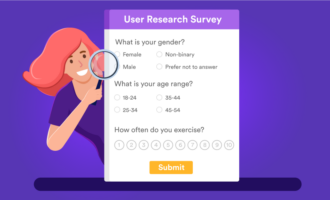


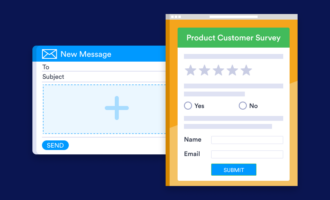

































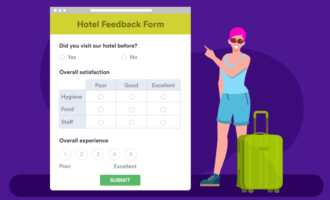


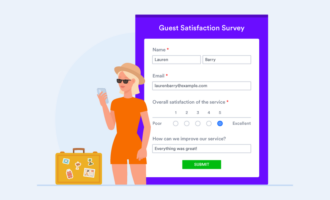




















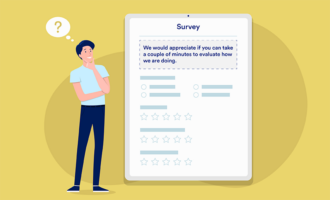


































Send Comment: